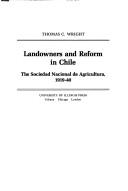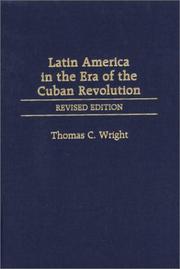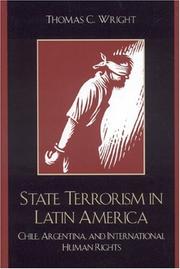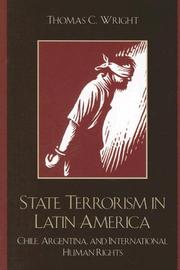| Listing 1 - 10 of 14 | << page >> |
Sort by
|

ISBN: 0252008537 Year: 1982 Publisher: Urbana University of Illinois Press
Abstract | Keywords | Export | Availability | Bookmark
 Loading...
Loading...Choose an application
- Reference Manager
- EndNote
- RefWorks (Direct export to RefWorks)
Political sociology --- Land. Real estate --- History of Latin America --- anno 1800-1999 --- Chile

ISBN: 0275967050 0275967069 Year: 2001 Publisher: Westport, Conn. : Praeger,
Abstract | Keywords | Export | Availability | Bookmark
 Loading...
Loading...Choose an application
- Reference Manager
- EndNote
- RefWorks (Direct export to RefWorks)
Radicalism --- Political violence --- Radicalisme --- Violence politique --- History --- Histoire --- Latin America --- Cuba --- United States --- Amérique latine --- Etats-Unis --- Politics and government --- Military policy. --- Politique et gouvernement --- Politique militaire

ISBN: 1461642809 9781461642800 074253720X 9780742537200 0742537218 9780742537217 Year: 2007 Publisher: Lanham Rowman & Littlefield
Abstract | Keywords | Export | Availability | Bookmark
 Loading...
Loading...Choose an application
- Reference Manager
- EndNote
- RefWorks (Direct export to RefWorks)
This cogent book examines the tragic development and ultimate resolution of Latin America's human rights crisis of the 1970s and 1980s. Thomas Wright focuses especially on state terrorism in Chile under General Augusto Pinochet (1973-1990) and in Argentina during the Dirty War (1976-1983). He offers a nuanced exploration of the reciprocal relationship between Argentina and Chile and human rights movements, clearly demonstrating how state terrorism in these countries strengthened the international human rights lobby and how, in turn, that more powerful lobby ultimately helped bring repressors t
Book
ISBN: 0292759274 Year: 2014 Publisher: Austin : University of Texas Press,
Abstract | Keywords | Export | Availability | Bookmark
 Loading...
Loading...Choose an application
- Reference Manager
- EndNote
- RefWorks (Direct export to RefWorks)
Universal human rights standards were adopted in 1948, but in the 1970s and 1980s, violent dictatorships in Argentina and Chile flagrantly defied the new protocols. Chilean general Augusto Pinochet and the Argentine military employed state terrorism in their quest to eradicate Marxism and other forms of “subversion.” Pinochet constructed an iron shield of impunity for himself and the military in Chile, while in Argentina, military pressure resulted in laws preventing prosecution for past human rights violations. When democracy was reestablished in both countries by 1990, justice for crimes against humanity seemed beyond reach. Thomas C. Wright examines how persistent advocacy by domestic and international human rights groups, evolving legal environments, unanticipated events that impacted public opinion, and eventual changes in military leadership led to a situation unique in the world—the stripping of impunity not only from a select number of commanders of the repression but from all those involved in state terrorism in Chile and Argentina. This has resulted in trials conducted by national courts, without United Nations or executive branch direction, in which hundreds of former repressors have been convicted and many more are indicted or undergoing trial. Impunity, Human Rights, and Democracy draws on extensive research, including interviews, to trace the erosion and collapse of the former repressors’ impunity—a triumph for human rights advocates that has begun to inspire authorities in other Latin American countries, including Peru, Uruguay, Brazil, and Guatemala, to investigate past human rights violations and prosecute their perpetrators.
Impunity --- Human rights --- Democracy

ISBN: 9780742537217 Year: 2007 Publisher: Lanham Rowman & Littlefield
Abstract | Keywords | Export | Availability | Bookmark
 Loading...
Loading...Choose an application
- Reference Manager
- EndNote
- RefWorks (Direct export to RefWorks)
Book
ISBN: 9781442235717 Year: 2017 Publisher: Lanham Rowman & Littlefield
Abstract | Keywords | Export | Availability | Bookmark
 Loading...
Loading...Choose an application
- Reference Manager
- EndNote
- RefWorks (Direct export to RefWorks)
This innovative text offers a clear and concise introduction to Latin America since independence. Thomas C. Wright traces continuity and change in five central colonial legacies: authoritarian governance; a rigid social hierarchy based on race, color, and gender; the powerful Roman Catholic Church; economic dependency; and the large landed estate. He shows that the outcomes of debate and contestation over these colonial legacies have been crucial in shaping contemporary political systems, economies, societies, and religious institutions in a richly diverse region. These unifying themes guide the reader through each period. The text's user-friendly illustrations, maps, chapter summaries, and suggestions for further reading enrich student understanding of a major part of the world--Provided by publisher.
Latin America --- History

ISBN: 0275940993 Year: 1991 Publisher: Westport Praeger
Abstract | Keywords | Export | Availability | Bookmark
 Loading...
Loading...Choose an application
- Reference Manager
- EndNote
- RefWorks (Direct export to RefWorks)
Radicalism --- Violence --- History --- Cuba --- Latin America --- United States --- Influence. --- Politics and government --- Military policy.
Book
ISBN: 9780292759275 0292759274 9780292759268 0292759266 1477309829 Year: 2021 Publisher: Austin
Abstract | Keywords | Export | Availability | Bookmark
 Loading...
Loading...Choose an application
- Reference Manager
- EndNote
- RefWorks (Direct export to RefWorks)
Universal human rights standards were adopted in 1948, but in the 1970s and 1980s, violent dictatorships in Argentina and Chile flagrantly defied the new protocols. Chilean general Augusto Pinochet and the Argentine military employed state terrorism in their quest to eradicate Marxism and other forms of “subversion.” Pinochet constructed an iron shield of impunity for himself and the military in Chile, while in Argentina, military pressure resulted in laws preventing prosecution for past human rights violations. When democracy was reestablished in both countries by 1990, justice for crimes against humanity seemed beyond reach. Thomas C. Wright examines how persistent advocacy by domestic and international human rights groups, evolving legal environments, unanticipated events that impacted public opinion, and eventual changes in military leadership led to a situation unique in the world—the stripping of impunity not only from a select number of commanders of the repression but from all those involved in state terrorism in Chile and Argentina. This has resulted in trials conducted by national courts, without United Nations or executive branch direction, in which hundreds of former repressors have been convicted and many more are indicted or undergoing trial. Impunity, Human Rights, and Democracy draws on extensive research, including interviews, to trace the erosion and collapse of the former repressors’ impunity—a triumph for human rights advocates that has begun to inspire authorities in other Latin American countries, including Peru, Uruguay, Brazil, and Guatemala, to investigate past human rights violations and prosecute their perpetrators.
Impunity --- Human rights --- Democracy
Book
ISBN: 9798216109167 1440857687 Year: 2018 Publisher: Santa Barbara, California : Praeger,
Abstract | Keywords | Export | Availability | Bookmark
 Loading...
Loading...Choose an application
- Reference Manager
- EndNote
- RefWorks (Direct export to RefWorks)
This book covers the events of the Cuban Revolution itself, the resulting radicalization of Latin American politics, the United States' responses to the threat of communist expansion in the hemisphere, and rural and urban guerrilla warfare that were spawned by the Cuban Revolution.
Radicalism --- Violence --- History --- Latin America --- Cuba --- United States --- Politics and government --- Influence. --- Military policy.
Digital
ISBN: 9780292759275 Year: 2021 Publisher: Austin, Tex. University of Texas Press
Abstract | Keywords | Export | Availability | Bookmark
 Loading...
Loading...Choose an application
- Reference Manager
- EndNote
- RefWorks (Direct export to RefWorks)
| Listing 1 - 10 of 14 | << page >> |
Sort by
|

 Search
Search Feedback
Feedback About UniCat
About UniCat  Help
Help News
News